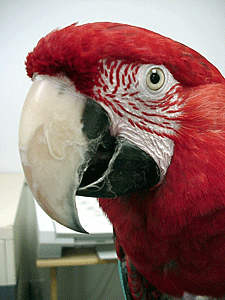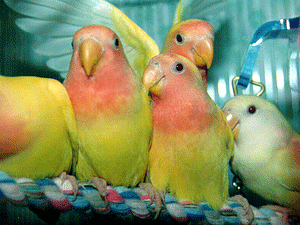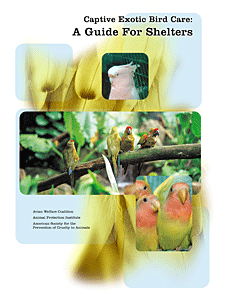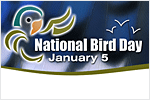Celebrated on January 5, National Bird Day is dedicated to raising awareness of the issues facing wild and captive birds, like Green-winged Macaw Koki.
Photo by Tina McCormick, MAARS
Mayor's Alliance Efforts Spotlight Education Around National Bird Day
January 5, 2007, marks the Fifth Annual National Bird Day — a day dedicated to raising awareness of the plight of exotic birds.
Coordinated by the Animal Protection Institute (API) and the Avian Welfare Coalition (AWC), National Bird Day is a good time to appreciate our native birds flying free outside and to reflect on how we treat the native birds of other countries. While the U.S. has enacted laws to protect our native birds — such as blue jays, cardinals, and crows — from commercial exploitation, we fail to offer the same protections to birds from other countries. This inconsistency leads to the widespread suffering of birds in the pet trade.
In 2007, the Mayor's Alliance for NYC's Animals joins in celebrating January 5 as a day of action on behalf of parrots and other captive birds. First, it has asked the Mayor's Office to issue a proclamation to officially recognize National Bird Day in New York City. In addition, the Mayor's Alliance for NYC's Animals will co-sponsor two very special educational activities in the New York City area for animal shelter workers and advocates.
National Bird Day Events in NYC
The Survival of Parrots: From Conservation to Animal Control
When: Thursday, January 4, 2007, 6:30-8:30 p.m.
Where: ASPCA Board Room, 424 East 92nd Street (between 1st and York Avenues), Manhattan
On the evening of Thursday, January 4, the ASPCA and the Mayor's Alliance for NYC's Animals will co-sponsor a special presentation — The Survival of Parrots: From Conservation to Animal Control — by the AWC.
The presentation and panel discussion will explore the many complex and challenging aspects of parrot welfare, including parrot species preservation in the wild, regulation of the wild and captive parrot trade, the effectiveness of existing animal protection laws, and the role of animal advocacy and care organizations in addressing the needs of displaced captive parrots.
The AWC will be joined by an esteemed panel of leaders in animal welfare, law enforcement, advocacy, and sheltering in the New York City area for what will be an informative and provocative discussion that will focus on the crucial welfare and protection issues that exotic birds face both in the wild and in captivity.
The event is free, but a small donation at the door to help defray the costs will be greatly appreciated. Space is limited. Please RSVP to info@avianwelfare.org to reserve your space.
Note: Birds and other non-human animals will not be permitted at this event.
The Survival of Parrots: From Conservation to Animal Control presentation and panel discussion on January 4, 2007, will focus on crucial avian welfare and protection issues.
Photo by Meredith Weiss
The Basics of Caring for Exotic Birds in the Shelter
When: Tuesday, January 9, and Wednesday, January 10, 2007
Where: Animal Care & Control (AC&C) shelter locations
On January 9 and 10, 2007, Eileen McCarthy, Co-Founder of the AWC and CEO of Midwest Avian Adoption & Rescue Services (MAARS), will conduct a workshop, The Basics of Caring for Exotic Birds in the Shelter, for shelter staff and volunteers at Animal Care & Control (AC&C) shelter locations.
Captive parrots have become one of the fastest growing groups of unwanted pets in the U.S. Unfortunately, there are far fewer options for exotic birds that become displaced. Fewer than 100 self-described avian rescue facilities exist in the U.S., and those are filled to capacity. Most traditional humane societies and shelters cannot meet the special needs of exotic birds. The unique status of parrots as wildlife — not domesticated animals — presents special challenges for traditional shelters that already are filled with homeless cats and dogs.
Addressing the care and placement needs of captive parrots and other birds requires a more proactive approach, one that engages both the avian welfare community and animal welfare, advocacy, and shelter organizations in working towards effective solutions.
Captive Exotic Bird Care: A Guide for Shelters was written specifically to help animal care workers and shelter staff provide the best possible care and placement for parrots and other exotic birds.
The AWC recently launched a Shelter Outreach Program, an initiative designed specifically for shelter and animal control organizations to help them gain the knowledge and skills to provide adequate services to captive birds. The initiative includes direct training and an important publication, Captive Exotic Bird Care: A Guide for Shelters, which is made available to shelters and rescue groups. The program has been successful, thanks to the collaborative efforts of the API and the ASPCA.
AC&C, in collaboration with the Mayor's Alliance for NYC's Animals and the AWC, has announced plans to expand its facilities and resources to help captive birds in need. Through its New Hope Program, AC&C seeks to collaborate with qualifying avian organizations and placement partners that can assist with foster care and arrange for suitable placement and/or permanent sanctuary for exotic birds.
The AWC's hands-on workshops to be conducted at AC&C shelters are intended to educate personnel and volunteers on the basics of caring for exotic birds, and cover a wide range of topics:
Housing and dietary requirements
Environmental safety
Quarantine and medical protocols
Signs of illness and disease
Basic avian physical exam
Common traits of parrots
Special considerations and placement options, and more
The workshops are open to AC&C animal care staff and volunteers and invited guests. To register for the training or to request more information, please e-mail info@avianwelfare.org.
Captive birds cannot be returned to the wild, since they do not possess the learned skills necessary to survive; nor can they be set free to fend for themselves. We have an ethical responsibility to provide the best care possible for those living in captivity. Efforts that promote public education, protective legislation, sheltering and placement, and conservation must be developed and implemented for exotic birds as they have been for domestic pets and other wild animals.
On January 5, let us not only honor our own native wild birds, but also remember that the native birds of other countries also belong in the wild, not in our homes.
To learn more about National Bird Day, visit www.NationalBirdDay.org. For more information on exotic bird welfare, visit the Avian Welfare Coalition website at www.AvianWelfare.org or the Animal Protection Institute's More Beautiful Wild campaign at www.MoreBeautifulWild.org.
Selected Articles of Interest
Avian Welfare Issues: An Overview
AWC Seeks Improved Care for Exotic Birds in Shelters
Educational Books for Children
Sylvan Dell Publishing creates "science and math through literature" picture books. Selections include:
by Andrea Vlahakis, illustrated by Emanuel Schongut
What miracle happens when Nicholas and his grandfather push aside all thoughts of material Christmas traditions to care for a young cardinal trapped during a Christmas Eve blizzard? How can young children help care for birds in their own backyard? Craft ideas include decorating trees with edible bird treats among others.
by Katherine Rawson, illustrated by Sherry Rogers
Imagine life if you were a parrot. Children morph into parrots as they learn how parrot bodies are adapted to help them climb, get food, and eat. What could YOU do with four toes — two that point forward and two backwards? Back matter includes bird fun facts and adaptations as well as a page on whether or not a child is ready for a pet parrot. The make-a-beak craft is perfect for young children.
by Jean Heilprin Diehl, illustrated by Kathryn Freeman
What happens when a young boy's pet dog chases a family of loons? How does the loon parent protect its young and who "wins" in Loon Chase? Back matter includes loon-related information and a Native American loon mask craft.
About the Author
Denise Kelly is co-founder and President of the Avian Welfare Coalition and a New York City resident. She has been active in animal welfare and protection for more than two decades. Her involvement with exotic bird welfare began in 1992, when she recognized the many problems brought on by the legal and illegal trade in exotic birds. Denise spent more than 22 years in the publishing world as director of marketing, new business development, and advertising sales for consumer publications and media companies. Since 2000, she has been associated with Best Friends Animal Society, managing the New York advertising sales and circulation office for Best Friends magazine.
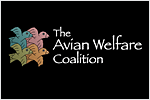 About the Avian Welfare Coalition
About the Avian Welfare Coalition
The Avian Welfare Coalition (AWC) was formed in 2000 to create a voice in the animal protection community for captive parrots and other birds exploited by the pet trade. The AWC is a working alliance of veterinarians, conservationists, and avian welfare and animal protection organizations dedicated to the ethical treatment of parrots and other captive birds.







